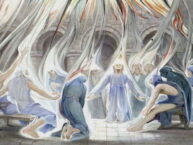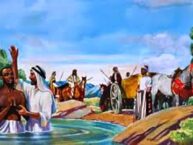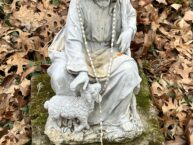 May 3, 2020: May God’s words be spoken, may God’s words be heard. Amen.
May 3, 2020: May God’s words be spoken, may God’s words be heard. Amen.
Welcome to what some like to call Good Shepherd Sunday, because, if you hadn’t noticed, nearly all our readings feature sheep, and/or a shepherd, somewhere in the verses. I mean, even though the lectionary will go through the first letter of Peter throughout this month, instead of starting at the beginning, it jumps first to the passage we heard this morning, then goes back to the previous chapter next week.. Why? Because the last verse of the passage assigned today has the words sheep and shepherd in it. There you have it – the logic of the lectionary.
While we are on the subject though, I want to just say that the passage from that epistle read this morning does NOT, and I repeat – NOT – mean that God wants you to suffer, or allow yourself to be abused or mistreated, or that people should endure injustice – but, that is, as I like to say, is a sermon for another Sunday.
Instead, how about a little bit of Jeopardy. We’ll take Church Teaching for $400 Alex. Answer: “Apostles teaching, breaking bread, fellowship, and prayers.” And the question? “What is found in both Acts 2:42 & the Baptismal Covenant?” How many of you just scored $400? If so, there is a virtual offering plate I will tell you about at The Peace.
The passage from the Acts of the Apostles – a book that is really the second part of a double feature written by the author of the Gospel of Luke – opens in this way “Those who had been baptized devoted themselves to the apostles’ teaching and fellowship, to the breaking of bread and the prayers.” If that sounds familiar, you likely scored a win in the Jeopardy portion of this service. It is indeed, word for word, one of the vows we make in our baptismal covenant, right? (BCP 304). You’all just renewed those vows on Easter Sunday, so I know it is fresh in your heart and minds. And the thing to remember about this teaching/fellowship/bread/prayers – it has everything to do with our life as shepherds in the model that Jesus himself gives to us in the gospel – and you thought I was going to ignore all these shepherds and sheep wandering around our scriptures – oh no…that is exactly what we need to focus on today too.
But for the moment, let’s stay with the text in Acts. After that initial verse we just talked about, the passage continues “All who believed were together and had all things in common; they would sell their possessions and goods and distribute the proceeds to all, as any had need. Day by day, as they spent much time together in the temple, they broke bread at home and ate their food with glad and generous hearts, praising God and having the goodwill of all the people.”
One of the things that always strikes me about this passage in Acts is that, taken on its own, one might be inclined to think that the life of those earliest followers was some sort of communal utopia among these house churches. This is the problem with getting only a small part of the story on any given Sunday. The thing is, those earliest parts of what would become the universal church were not idyllic – some were persecuted or martyred, disagreements over direction erupted, and factional splits occurred. Some scholars have even suggested that this particular passage in Acts reflects more of the author’s rose-colored view than the reality of the day. Certainly some of that is captured in ensuing chapters.
Yet there is a reason this Jesus Movement managed to survive then, and through the centuries, and it is because in that call to continue in the apostle’s teaching, to be in fellowship, to break bread, to pray – in that vow – are found the very keys to unlocking the proverbial door to our life in Christ (or unlocking the gate as the gospel translation changes the Greek to say). It is the very thing that will help us live what we proclaim – that we are followers of Jesus, that we are the body of Christ. For if we are that, then we are to be as he is, shepherds of God’s creation, and that – well that means we are active agents in this world and charged with great responsibility.
Because for followers of Jesus, it isn’t enough to call upon God to shepherd us through the valleys of the shadow of death as described in that oh so familiar Psalm we heard today. Those difficult journeys are an inevitable part of living, and it is when God as our shepherd can be a source of strength, courage, and guidance through it – and that’s a good thing. But our life in Jesus also calls us to BE the shepherd for others, for we are to imitate Christ in our lives as well as in our devotion and study – and that is what those earliest followers were trying to do as we heard in Acts – they were acting as shepherds to one another, and to the larger community around them.
And, if there was ever a time we need to embrace our identity as followers of Jesus, it is now. The thing is, crises like this pandemic bring out the best in us, and sadly the worst in us too. The heroes today are all those who put their own health on the line to care for the sick, the journalists who ask the tough questions to expose wrongdoing, the people who stay home even when they want to bang their head against the walls of their house, the ones who keep socially distant in face masks when they go out, the teachers who adapted entire school lessons into a format workable for virtual classrooms, the church musicians and singers who give us the joy of their music to fill our weary souls, and so many more.
But there are sadly others – the ones who demand that it is their, quote “God given right,” to go where ever and whenever they want, the ones who won’t wear face masks (like our Vice-President), the ones who force others to risk their lives to vote, the ones who feel it is more important to go to the beach than to protect lives, the ones who steal life saving PPE and ventilators from states who have paid for them to protect their political interests, the ones who spread false information and conspiracy theories, the ones who purposely cough on police officers and cashiers, the ones who lick items in the grocery store to spread their germs, the ones who hoard, the ones who price gouge, and on and on and on. They are the lost sheep, the ones who have become like wolves in sheep’s clothing.
One of the things that really struck me as I watch some of this all play out is how often the ones doing these wolfish things claim to be Christian. Somewhere along the way, we have lost these sheep to a God of their own making, a Jesus of their own wolfish desires. Because the life of the apostles described in Acts, while perhaps more of an ideal than a lived reality, is truly the life of a shepherd, of a follower of Jesus. It is the life to which we should all aspire to live each and every day, even if sometimes we fall short of the mark.
To be a Christian is to put the service of others above our own desires, and certainly never to put our rights before our responsibilities in the name of Jesus – the one who called us to love one another as we love ourselves – the very model of shepherd. We do this out of love, of course, but also because we know that if we are not good shepherds, the wolves will devour the sheep, will devour us, and then they will devour one another – it is inevitable, because we are part of a larger web of life – connected to one another and to all of God’s creation. What happens to one of us, happens to us all in the end.
When I was working on this sermon yesterday, I came across a blog post by the Rt. Rev. Gregory H. Rickel, Bishop of Olympia. In it, he was lamenting just this very thing in our faith. He begins this way:
““A Pissing Section in the Pool.”” That is what he said. I don’t even remember what news program and what epidemiologist, as I am in the Zoom/News blur of pandemic life, but I very much remember his answer. The reporter asked the epidemiologist, “with no federal coordinated response, and some governors defying guidelines for reopening, do you think this uncoordinated approach will work?” The epidemiologist just looked back at the camera and said, “does a pissing section in the pool work?”…
This sudden epiphany made me see how our theology bleeds into our common life. As divided as our country is, so is Christianity. We have, over time, developed on a more overarching level, two distinct and nearly opposite theologies. One I call “personal freedom theology”. You recognize this by people in the protests carrying signs that say, “Jesus is my vaccine” or during interviews saying things like, “it is my God given right to..blah, blah, blah.” This is a personal God that only worries about you. This is the old Tom T. Hall song, “me and Jesus got our own thing going” theology. No one else matters. Or only those who can help me in some way matter. I find it very difficult to find much in our guide, Scripture, about this theology.”1
Amen, brother. Amen.
This is not how we are to live. It is not the teaching of the apostles, which was given to them by Jesus. No, the model of Christianity we are called to is the one found in this passage of Acts. While an ideal, it is the vision of the beloved community in which we live as shepherds to one another, and to all of God’s children. And the way in which we get there is through continued fellowship, continued sharing of what we have, continued prayers and devotion. Nothing about this pandemic and our stay at home requirement changes any of that.
We may not be able to break bread here in this church, but we can break it with one another in our homes, and share whatever we are able to those in need through food pantry and animal shelter donations of food and supplies. We may not be able to attend Sunday School or participate in formation programs in person, but there are scores of opportunities to do that online. We may not be able pray on our knees here in the pews, but we can certainly pray in the quiet moments of the early morning, late evening, in our cars, and before our meals.
Now look, as I said before, this utopian image of the early life of the Jesus Movement was not the reality. If you are absolutely crawling the walls looking for a way to break out of the very close fellowship that has overwhelmed every single second of your daily life – that’s okay. It is understandable. And God doesn’t ask for that level of perfection. But it is why we need those prayers and teachings or scriptures, our daily bread if you will, to sustain us and bring our life in Christ to mind, that we might come closer each day to that place where we are the good shepherds we are called to be. For we cannot be good shepherds and endanger the sheep, and all of creation are the sheep entrusted to us.
The thing is, if our desire to revive the economy, get out of the house, go back to our hobbies, or send our kids to school comes at a cost to others, we have only one choice to make. Except in matters of self-defense, how we choose to live our life cannot come at the cost of another human being. If it does, then we are not only pissing in the pool in which we ourselves swim, we turn our backs on Jesus who is in the pool with us. For in all who suffer, we find the crucified one. That is what Jesus was trying to tell us in the gospel – that is what those first followers of his understood.
Do you think Jesus was talking about being a shepherd in this gospel passage because he happened to walk by a pasture? No. This gospel we heard today is right after he heals the blind man. Jesus then talks about what all that means. It is the classic pattern in the Gospel of John. Jesus does a sign and then he offers a discourse to explain it – or as one might say – he does a miracle and then talks a LOT, a whole LOT.
The passage today comes on the heels of his healing of the blind man and bringing him into his fold after the man was repeatedly cast aside by his community – a group who claimed allegiance to God if you can believe it. Then Jesus explains what all this means using the analogy of the shepherd– he is the shepherd of the sheep, the one who opens the door to all. That is how he explains the sign of healing and inclusion of the blind man as one of his own. Jesus, the Good Shepherd, cares for all, most especially those on the margins, and opens the door that all may know God’s grace. That is what those earliest apostles were teaching and living out. That is what we are called to in our baptism. To be the shepherd who opens the doors for all of God’s sheep and loves them as he loved us.
Bishop Rickel, toward the end of that blog post, said this “Christianity is not a faith with “rights”. It is a faith with “calls”.
Hear that again: “Christianity is not a faith with “rights”. It is a faith with “calls.”
And, if we are truly to be the people of the Jesus Movement, if we are to live into our call as the body of Christ we accepted in our baptism, then we must strive each day to step closer to the ideal found in Acts – to consider all others as part of a larger whole – as part of that proverbial pool that the epidemiologist that Bishop Rickel’s quotes. What we do to others, we do to ourselves, to our very souls, to Jesus. A shepherd does not turn her back on her sheep, nor can we. We have a choice to make every day of our lives:
Will we continue in the apostles teaching – reminding ourselves of our call, or will we ignore it, or pervert it, to meet our own selfish ends.
Will we break bread and share it with others, or will we turn our backs on our sheep while the wolf of hunger, poverty, violence and oppression devour them.
Will we continue in our prayers and devotions – giving thanks to God for each breathe of life we have, or will we kneel before the God of our making and exchange our shepherds crooks for being a crook who steals from others their dignity, their spirit, their very life.
The good shepherd, Jesus, calls you into the life of the apostles.
Whose voice do you hear and follow? His…or your own?
The choice you make will be the difference between swimming in the waters of baptism or drowning in a pool with a section reserved for…well, you know.”
Amen.
For the audio from the 10:30am service, click below, or subscribe to our iTunes Sermon Podcast by clicking here:
1 http://www.bishoprickel.com/blog/a-pissing-section-in-the-pool?fbclid=IwAR0xAX2jpIPXqjFQeFJ0-o7iNgE_g5SNzILis-OLoPY4Zu9MNoRCt_EITnk
The Rev. Diana L. Wilcox
Christ Church in Bloomfield & Glen Ridge
May 3, 2020 – In A Time of Separation
The Fourth Sunday of Easter – Year A
1st Reading – Acts 2:42-47
Psalm 23
2nd Reading – 1 Peter 2:19-25
Gospel – John 10:1-10






